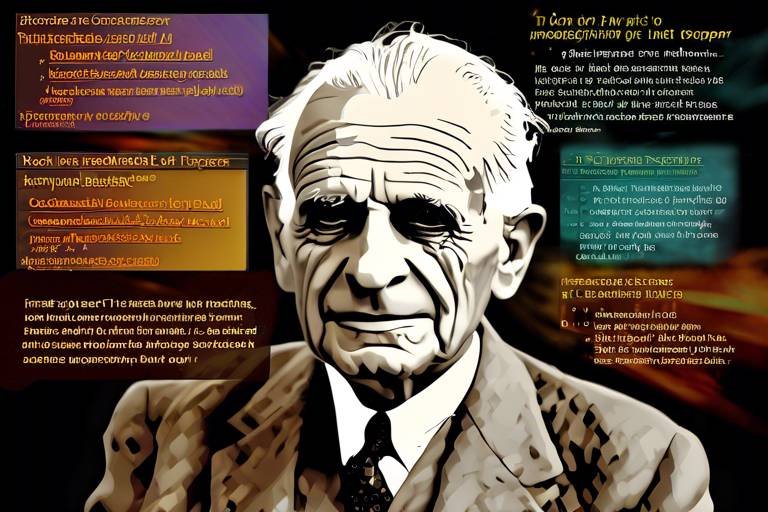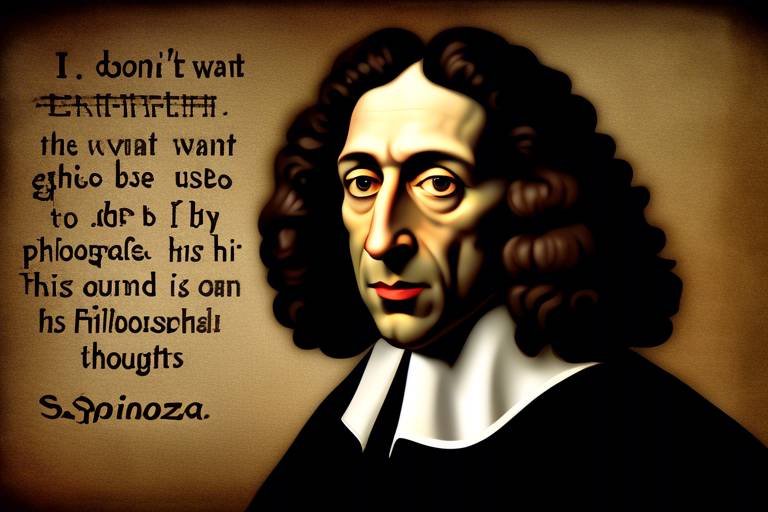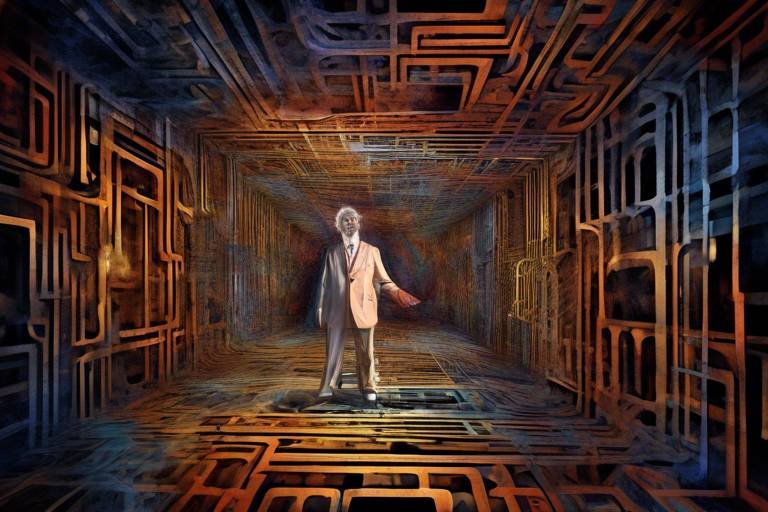The Contributions of Karl Popper to the Philosophy of Science
Karl Popper, a name that resonates deeply within the realms of philosophy and science, has made remarkable contributions that continue to shape our understanding of scientific inquiry. Born in Austria in 1902, Popper's journey through the intellectual landscapes of the 20th century led him to challenge established norms and propose revolutionary ideas that questioned the very foundations of how we approach knowledge and truth in science. His work is not just academic; it serves as a beacon of critical thinking that encourages scientists and philosophers alike to rethink the way they engage with the world around them. So, what exactly did Popper contribute that was so groundbreaking? Let's dive into the core of his philosophy and explore the profound impact he has had on the philosophy of science.
At the heart of Popper's philosophy lies the concept of falsifiability, which he posited as a criterion for distinguishing scientific theories from non-scientific ones. This idea is pivotal because it shifts the focus from verification—proving a theory to be true—to falsification, where the goal is to test theories rigorously and seek out conditions under which they could be proven false. This approach not only promotes a more dynamic understanding of scientific theories but also recognizes that science is an evolving discipline, constantly refining itself through the process of trial and error. Imagine a scientist as a detective, tirelessly searching for clues that could unravel a case; similarly, Popper viewed scientists as individuals seeking to disprove rather than confirm their hypotheses, which ultimately leads to a more robust understanding of the universe.
Moreover, Popper's critique of the traditional view of induction in science was revolutionary. He argued that induction—the process of drawing general conclusions from specific observations—could not provide absolute certainty. This challenge to the status quo reshaped scientific reasoning, pushing scholars to reconsider how they validate their theories. Instead of relying on a series of observations to support a theory, Popper encouraged a more skeptical approach, one that acknowledges the limitations of our observations and the potential for error. In doing so, he laid the groundwork for a more critical and reflective scientific method, one that prioritizes questioning over acceptance.
Another significant aspect of Popper's philosophy is his critique of logical positivism, which emphasized verificationism—the idea that a statement is only meaningful if it can be empirically verified. Popper argued that this perspective was too restrictive and failed to account for the complexities of scientific theories. His rejection of the verification principle opened up new avenues for philosophical inquiry, allowing for a broader understanding of scientific discourse. Through his arguments, Popper demonstrated that science is not just about confirming hypotheses but also about recognizing the limitations of our knowledge and the uncertainties that accompany it.
Popper's notion of scientific progress through conjectures and refutations is another cornerstone of his philosophy. He proposed that science advances not through the accumulation of verified truths but through a cycle of proposing bold hypotheses (conjectures) and rigorously testing them (refutations). This dynamic process fosters innovation, as scientists are encouraged to think creatively and challenge existing paradigms. Just as a sculptor chisels away at a block of marble to reveal a masterpiece, scientists refine their theories through critical testing, ultimately leading to a clearer understanding of the natural world.
In Popper's view, theories are not immutable truths waiting to be discovered; rather, they are temporary constructs subjected to rigorous testing. This perspective emphasizes the provisional nature of scientific knowledge, encouraging scientists to remain open to new ideas and willing to revise their theories in light of new evidence. Such a mindset fosters a culture of inquiry and adaptability, essential traits for any scientific endeavor.
Finally, Popper's work addresses the demarcation problem, which seeks to differentiate science from pseudoscience. He provided criteria for distinguishing between the two, emphasizing that genuine scientific theories must be falsifiable. This distinction is crucial in an age where misinformation can spread rapidly, and it serves as a reminder of the importance of critical thinking and skepticism in evaluating claims. By establishing clear boundaries, Popper has empowered scientists and the public to engage with scientific discourse more thoughtfully.
In conclusion, Karl Popper's contributions to the philosophy of science are profound and enduring. His ideas on falsifiability, the critique of induction, and the dynamic nature of scientific progress have reshaped our understanding of scientific inquiry. As we continue to navigate the complexities of knowledge in the modern world, Popper's philosophy remains a guiding light, reminding us of the importance of questioning, testing, and refining our understanding of the universe.
- What is falsifiability? Falsifiability is the principle that a theory must be able to be proven false to be considered scientific.
- How did Popper challenge induction? Popper argued that induction cannot guarantee absolute certainty and that scientific reasoning should focus on testing theories instead.
- What is the demarcation problem? The demarcation problem is the challenge of distinguishing science from pseudoscience, which Popper addressed through his criteria of falsifiability.
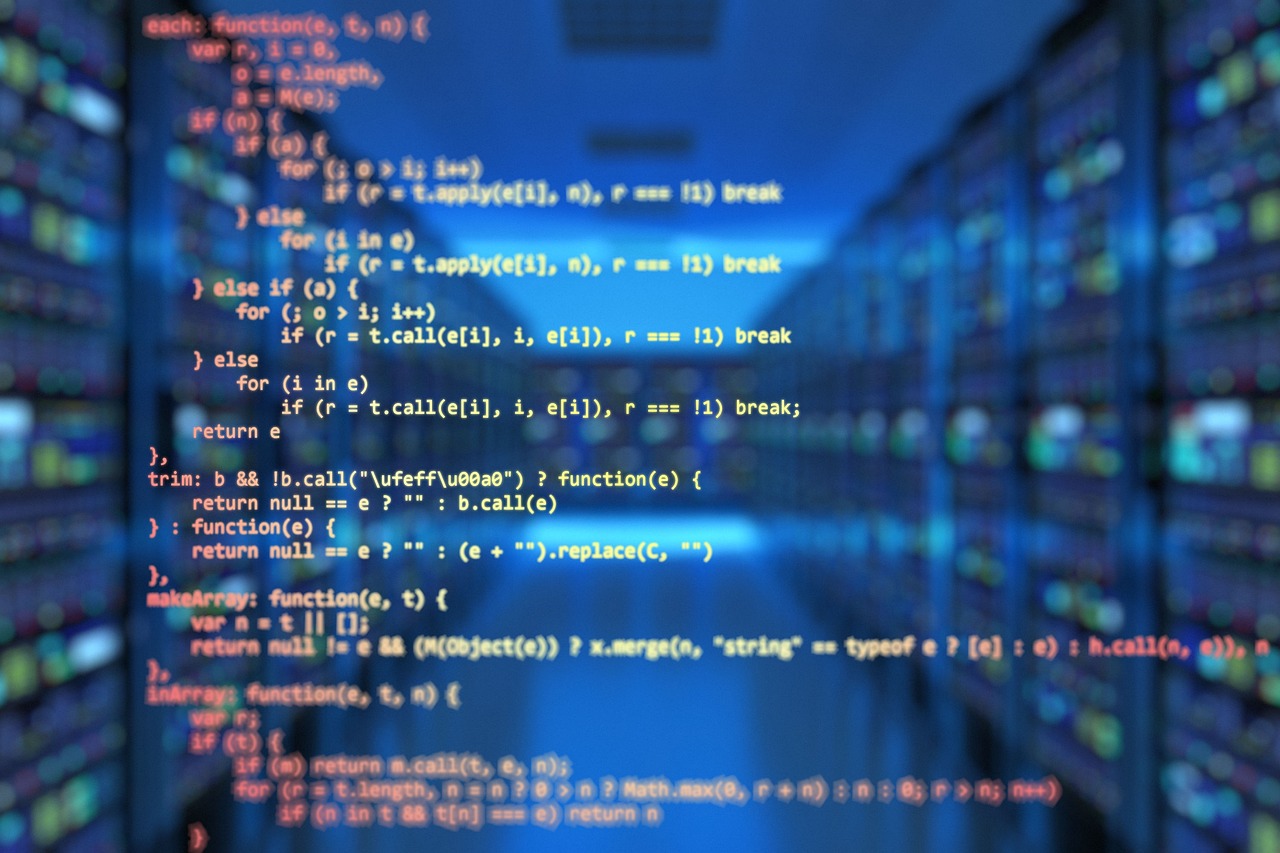
Popper's Falsifiability Criterion
When we dive into the realm of science, one name that often pops up is Karl Popper. His concept of falsifiability is like a lighthouse guiding us through the murky waters of scientific inquiry. But what does this really mean? In simple terms, Popper argued that for a theory to be considered scientific, it must be testable and, crucially, it must be falsifiable. This means that there should be a possible observation or experiment that could prove the theory wrong. Imagine trying to find a treasure chest hidden on a deserted island; if you can’t dig it up or prove it doesn’t exist, how can you claim it’s there?
This criterion serves as a **sharp knife** that slices through the fog of pseudoscience. Take, for instance, the claim that “all swans are white.” This statement can be tested by observing swans. If you find just one black swan, the theory is falsified. In contrast, consider the claim that “a deity exists.” This is much harder to test, as it lacks a clear method of falsification. This is why Popper insisted that the demarcation between science and non-science hinges on this critical aspect of falsifiability.
Popper's emphasis on falsifiability reshaped the approach to scientific testing. Instead of trying to prove theories right, scientists began to focus on trying to prove them wrong. This shift is akin to a game of chess, where each move is carefully calculated to anticipate the opponent's strategy. By actively seeking out evidence that could contradict their hypotheses, scientists engage in a more rigorous form of inquiry. This leads to a more dynamic understanding of science as a process of trial and error rather than a mere collection of facts.
Furthermore, Popper's criterion has significant implications for the progress of science. It encourages scientists to discard theories that no longer hold up under scrutiny, paving the way for new ideas and innovations. This cycle of conjectures and refutations—where bold hypotheses are proposed and then tested—fuels scientific advancement. It’s like a dance where each step is taken with caution, yet with the excitement of what the next move might unveil.
To illustrate, let's consider a table that contrasts scientific theories with non-scientific claims based on Popper's falsifiability criterion:
| Criteria | Scientific Theory | Non-Scientific Claim |
|---|---|---|
| Testability | Can be tested through experiments | Cannot be tested or observed |
| Falsifiability | Can be proven wrong | Cannot be proven wrong |
| Examples | Newton's Laws of Motion | Astrology |
In summary, Karl Popper's falsifiability criterion is not just a philosophical musing; it is a cornerstone of scientific methodology. By demanding that theories be testable and falsifiable, Popper has equipped scientists with a powerful tool to differentiate between what is genuinely scientific and what is mere speculation. As we continue to explore the mysteries of the universe, this principle remains a beacon of clarity, urging us to question, test, and refine our understanding of the world around us.

The Problem of Induction
The problem of induction is a philosophical conundrum that has puzzled thinkers for centuries. At its core, it questions the justification of inductive reasoning, which is the process of drawing general conclusions from specific observations. Think about it: when you see the sun rise in the east every morning, you might conclude that it will always rise in the east. However, can we truly justify this belief? Karl Popper, a prominent figure in the philosophy of science, took a bold stance against the traditional views surrounding induction. He argued that while induction might seem intuitive, it does not provide the absolute certainty that many scientists seek.
Popper's critique of induction is rooted in the notion that no amount of empirical observations can ever guarantee the truth of a universal statement. For instance, you can observe countless white swans and conclude that all swans are white. Yet, this conclusion is only as reliable as the observations you’ve made. The moment you encounter a black swan, your theory collapses like a house of cards. This is the essence of Popper's argument: the inability of induction to provide certainty leads to the necessity of a different approach to scientific reasoning, one that embraces skepticism and critical testing.
To illustrate Popper's perspective, consider the following points:
- Empirical Evidence is Insufficient: Just because something has always happened in the past does not mean it will happen in the future.
- Universal Statements are Vulnerable: Inductive reasoning often leads to generalizations that can be easily disproven by a single counterexample.
- Focus on Falsifiability: Instead of seeking to prove theories true, scientists should aim to test and potentially falsify them.
Popper's challenge to the problem of induction reshaped scientific reasoning. He proposed that instead of relying on induction, scientists should formulate hypotheses and then rigorously test them. This approach emphasizes the importance of falsifiability—the idea that for a theory to be scientific, it must be possible to conceive of an observation or experiment that could refute it. In this way, science becomes a dynamic process of conjectures and refutations, where theories are constantly tested and improved upon rather than simply accepted based on past observations.
In summary, while induction has been a fundamental aspect of scientific reasoning, Popper's critique reveals its limitations. By advocating for a more skeptical and critical approach to scientific inquiry, he opened the door for a new understanding of how knowledge is constructed and validated. This shift not only impacts the philosophy of science but also influences the practical methodologies employed in scientific research today.
- What is the problem of induction? The problem of induction questions the justification of drawing general conclusions from specific observations, highlighting the uncertainty of such reasoning.
- How did Karl Popper address the problem of induction? Popper argued that instead of relying on induction, scientists should focus on formulating hypotheses and testing them for falsifiability.
- Why is falsifiability important in science? Falsifiability is crucial because it allows for the possibility of disproving a theory, which is essential for scientific progress and validation.

Critique of Logical Positivism
Karl Popper's critique of logical positivism is a fascinating journey into the heart of scientific philosophy. Logical positivism, which emerged from the Vienna Circle in the early 20th century, emphasized the verification principle. This principle posited that a statement is only meaningful if it can be empirically verified. In other words, if you can't observe it or measure it, it doesn't matter. But Popper wasn’t buying it. He argued that this approach was fundamentally flawed and overly restrictive. After all, how could we account for the vast expanse of scientific theories that, while not directly observable, still hold significant explanatory power?
One of Popper's most compelling arguments against logical positivism was its inability to account for the **falsifiability** of theories. He proposed that instead of seeking to verify hypotheses, scientists should focus on attempting to disprove them. This shift in perspective was revolutionary. It meant that a theory could be considered scientific not because it could be proven true, but because it could withstand rigorous testing and potential refutation. For example, the theory of evolution is a scientific theory not because it has been conclusively proven, but because it has survived numerous attempts to disprove it.
Furthermore, Popper pointed out that the verification principle itself could not be empirically verified, which led to a paradox. If logical positivism claims that only verifiable statements are meaningful, then the verification principle is meaningless because it cannot be verified. This self-referential inconsistency was a significant blow to the logical positivist framework.
Popper's critique also highlighted the limitations of verificationism, which often led to the dismissal of valuable scientific theories that could not be easily tested. The implications of this critique are profound. By prioritizing falsifiability over verification, Popper opened the door to a broader understanding of scientific inquiry, where theories could be evaluated based on their robustness and adaptability rather than their ability to be immediately confirmed.
In essence, Popper's arguments against logical positivism not only challenged the status quo but also laid the groundwork for a more dynamic and resilient approach to scientific methodology. His ideas encourage scientists to embrace uncertainty and view theories as provisional rather than absolute truths, fostering an environment where inquiry and innovation can thrive.

Scientific Progress through Conjectures and Refutations
Karl Popper's vision of scientific progress is a captivating journey that revolves around the dynamic interplay of conjectures and refutations. Imagine a scientist standing at the edge of a vast ocean of knowledge, casting out hypotheses like fishing lines, hoping to reel in discoveries. Each hypothesis represents a conjecture—a bold assertion about the nature of reality that invites scrutiny and testing. But how do we know if these conjectures hold water? This is where the concept of refutation comes into play.
In Popper's framework, scientific knowledge is not about accumulating verified truths but rather about continuously challenging and refining our ideas. When a conjecture is put to the test, it must withstand rigorous examination. If it fails to do so, it is refuted, leading to a deeper understanding of the subject at hand. This cycle of proposing bold ideas and subjecting them to critical scrutiny is akin to a game of intellectual chess, where each move must be carefully considered and defended.
The significance of this process cannot be overstated. It fosters an environment where scientists are encouraged to think critically and creatively, pushing the boundaries of what we know. As Popper famously stated, “Science must begin with myths, and with the criticism of myths.” This implies that every scientific theory begins as a conjecture, and through the process of refutation, we inch closer to the truth. The more a theory is tested and the more it survives attempts at refutation, the more robust it becomes, albeit never truly proven.
To illustrate this concept, consider the following table that summarizes the stages of scientific progress through conjectures and refutations:
| Stage | Description |
|---|---|
| 1. Conjecture | A bold hypothesis is proposed, often based on existing knowledge or intuition. |
| 2. Testing | The conjecture is subjected to empirical testing through experiments and observations. |
| 3. Refutation | If the conjecture fails the test, it is refuted, prompting further inquiry. |
| 4. Revision | Scientists revise the conjecture based on feedback and new evidence, leading to new hypotheses. |
| 5. Progress | Through this iterative process, scientific knowledge evolves and becomes more refined. |
This cyclical nature of scientific inquiry not only enhances our understanding of the natural world but also underscores the importance of remaining open-minded and flexible in our thinking. Each refutation is not a failure but rather a stepping stone towards greater clarity and insight. Popper's emphasis on this process has profound implications for how we approach scientific research today. It teaches us that in the quest for knowledge, we must embrace uncertainty and view challenges as opportunities for growth.
In conclusion, Popper's model of scientific progress through conjectures and refutations is a powerful reminder that science is a living, breathing entity. It thrives on the tension between ideas and evidence, constantly evolving as we seek to understand the complexities of our universe. By fostering a culture of critical inquiry and resilience, we can ensure that the pursuit of knowledge remains an exciting and fruitful endeavor.
- What is the main idea behind Popper's philosophy of science?
Popper's philosophy centers around the idea that scientific knowledge advances through conjectures that can be tested and potentially refuted, rather than through verification. - Why is falsifiability important?
Falsifiability distinguishes scientific theories from non-scientific ones. A theory must be testable and capable of being proven false to be considered scientific. - How does Popper's view differ from traditional views of science?
Traditional views often emphasize verification and accumulation of evidence, while Popper focuses on the importance of refutation and critical testing.
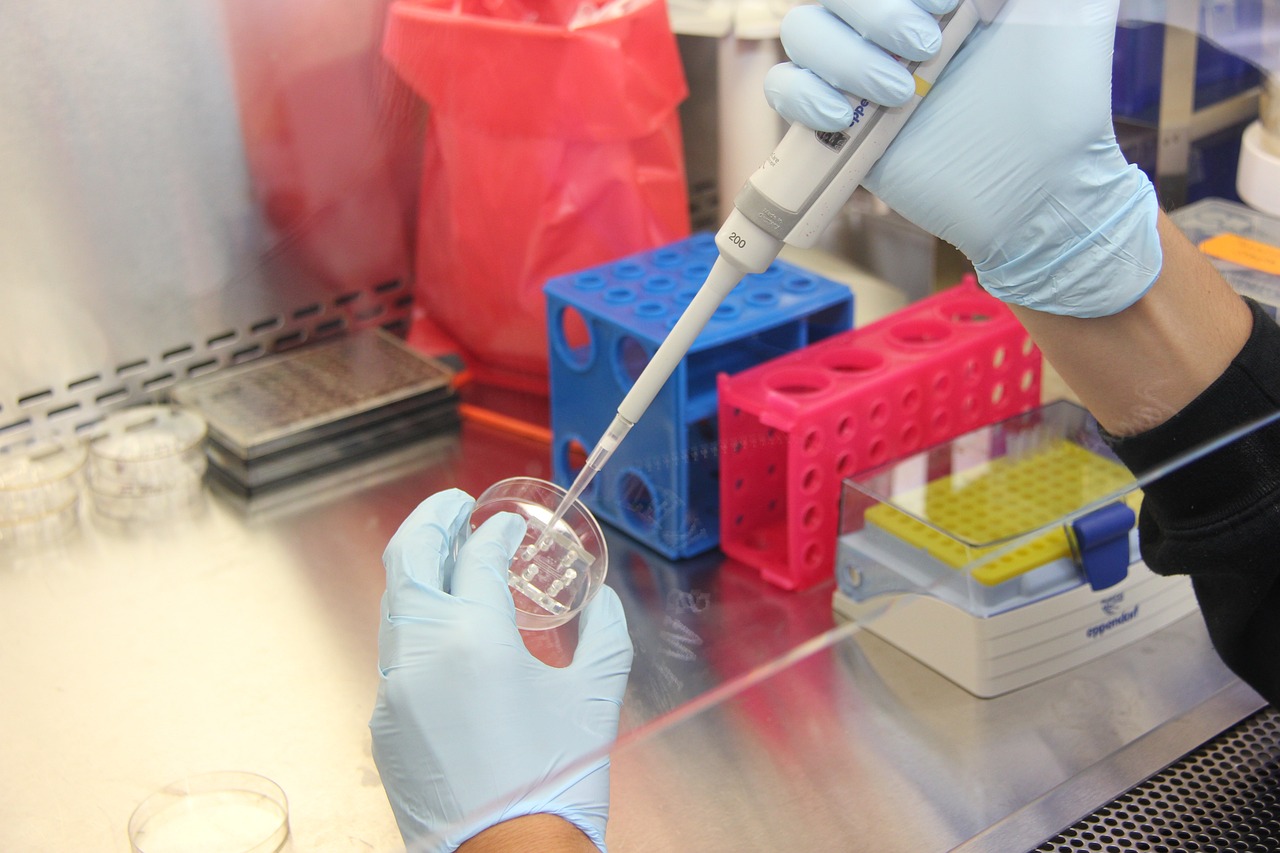
Role of Theories in Science
In the realm of science, theories play a crucial role that goes beyond mere explanations of phenomena. According to Karl Popper, theories are not definitive truths waiting to be discovered; rather, they are temporary constructs that must withstand rigorous testing and scrutiny. This perspective radically shifts how we view the scientific process. Instead of seeing theories as final answers, we should see them as stepping stones on the path to greater understanding.
Popper argued that every scientific theory is inherently provisional, meaning it is always open to challenge and revision. This notion is pivotal because it encourages scientists to remain critical thinkers rather than complacent believers in established doctrines. When a theory is proposed, it should not be treated as a conclusion but rather as a hypothesis that invites experimentation and potential falsification. This dynamic nature of theories fosters a culture of innovation and progress in scientific inquiry.
To illustrate this point, consider the evolution of the theory of gravity. Initially articulated by Isaac Newton, the law of universal gravitation provided a robust framework for understanding how objects interact in space. However, it was not until Albert Einstein introduced his theory of general relativity that our understanding of gravity expanded. Einstein's theory did not disprove Newton's; instead, it built upon it, offering a more comprehensive view that accounted for anomalies that Newtonian physics could not explain. This is a perfect example of how scientific theories evolve and adapt over time.
Furthermore, Popper emphasized the importance of testing in the scientific process. Theories should be subjected to rigorous experiments designed to challenge their validity. This testing phase is not merely a formality; it is the lifeblood of scientific discovery. By actively seeking to disprove a theory, scientists can uncover its limitations and refine it, leading to a more profound understanding of the subject matter. In this sense, the role of theories is to act as a catalyst for inquiry, prompting further investigation and exploration.
Moreover, the temporary nature of theories allows science to be a self-correcting enterprise. As new data emerges, theories can be adjusted or discarded altogether. This adaptability is crucial in a world where new technologies and methodologies provide fresh insights into longstanding questions. In essence, theories serve as the framework upon which scientific knowledge is built, but they are never the final word. They are the tools that scientists use to navigate the complexities of the universe.
In conclusion, the role of theories in science, as articulated by Popper, is foundational yet fluid. They are not static endpoints but dynamic entities that evolve with new evidence and insights. This understanding invites scientists to engage in a continuous cycle of questioning, testing, and refining, ultimately leading to a deeper and more nuanced comprehension of the natural world.
- What is the main idea behind Popper's philosophy of science?
Popper's philosophy centers around the concept of falsifiability, suggesting that for a theory to be considered scientific, it must be able to be tested and potentially disproven. - How do theories evolve in science?
Theories evolve through a process of conjectures and refutations, where new evidence can either support or challenge existing theories, leading to their refinement or replacement. - Why is the temporary nature of theories important?
This temporary nature encourages scientists to remain open-minded and critical, fostering an environment of continuous learning and discovery.

Demarcation Problem
The is one of the most significant issues in the philosophy of science, and it was brought to the forefront by Karl Popper. At its core, the demarcation problem seeks to answer a fundamental question: What distinguishes science from non-science or pseudoscience? In a world overflowing with claims and theories, understanding this distinction is crucial for both the scientific community and society at large. Popper's approach to this problem was revolutionary, as he proposed that the ability to be falsifiable is what sets scientific theories apart from those that fall into the realm of pseudoscience.
To illustrate this point, consider the following example: a scientific theory, such as Einstein's theory of relativity, can be tested and potentially disproven through experiments and observations. If new evidence emerges that contradicts the theory, it can be revised or rejected. In contrast, a pseudoscientific claim, such as astrology, often relies on vague assertions that cannot be tested or disproven. This leads to a situation where the claim is immune to falsification, allowing it to persist despite a lack of empirical support.
Popper emphasized that the hallmark of a scientific theory is its testable predictions. He argued that for a theory to be considered scientific, it must make predictions that can be observed and potentially proven wrong. This criterion of falsifiability not only clarifies the demarcation problem but also encourages a more rigorous approach to scientific inquiry. By focusing on what can be disproven, scientists are pushed to develop more precise and testable hypotheses.
Furthermore, Popper's demarcation criterion has implications beyond just identifying scientific theories. It also fosters a culture of critical thinking within the scientific community. When researchers are encouraged to challenge existing theories and seek out evidence that could potentially disprove them, science becomes a dynamic and evolving field. This process of constant questioning and testing is what drives scientific progress and innovation.
However, it's important to recognize that Popper's demarcation problem is not without its challenges. Critics argue that some scientific theories may not be easily falsifiable, especially in fields like theoretical physics or cosmology, where experiments may be difficult or impossible to conduct. Additionally, some argue that the strict adherence to falsifiability may exclude valuable theories that do not fit neatly into this framework. Nevertheless, Popper's contributions to the demarcation problem have sparked ongoing debates and discussions that continue to shape the philosophy of science today.
In conclusion, the demarcation problem remains a critical issue in understanding the nature of scientific inquiry. Popper's emphasis on falsifiability as a distinguishing feature of scientific theories has not only clarified this problem but has also influenced how science is conducted. By establishing clear criteria for what constitutes science, Popper has provided a framework that encourages rigorous testing and critical evaluation, ultimately advancing our understanding of the natural world.

Influence on Scientific Methodology
Karl Popper's contributions to scientific methodology are nothing short of revolutionary, reshaping how scientists approach their work. His emphasis on falsifiability as a criterion for demarcating scientific theories from non-scientific ones has had profound implications for how research is conducted. Rather than seeking to confirm hypotheses, Popper argued that scientists should actively seek to disprove them. This shift in perspective encourages a more rigorous and critical approach to scientific inquiry, fostering an environment where theories are constantly tested and refined.
One of the most significant impacts of Popper's philosophy is the promotion of a critical rationalism in scientific practice. This approach encourages scientists to remain skeptical of their own theories and to view them as provisional. By treating theories as conjectures that must withstand rigorous testing, researchers can better navigate the complexities of the natural world. This methodology not only enhances the reliability of scientific findings but also accelerates the pace of discovery, as scientists are motivated to explore new ideas and challenge existing paradigms.
In practical terms, Popper's influence can be seen in various scientific disciplines, from physics to social sciences. For instance, in the realm of experimental science, researchers are now more likely to design experiments that aim to falsify their hypotheses rather than merely confirm them. This shift has led to more robust experimental designs and has minimized the risk of biases that can arise from confirmation bias. In a sense, Popper's ideas have instilled a sense of intellectual humility in scientists, reminding them that no theory is beyond scrutiny.
Moreover, Popper's philosophy has inspired the development of methodologies that prioritize empirical testing and reproducibility. For instance, the scientific method itself has evolved to incorporate more rigorous standards for testing and validating theories. As a result, the scientific community has established clearer guidelines for what constitutes a valid scientific claim, thereby enhancing the credibility and reliability of scientific research.
To illustrate the practical applications of Popper's philosophy in modern science, we can look at a few key areas:
| Field | Application of Popper's Ideas |
|---|---|
| Physics | Experimental designs that prioritize falsification of theories. |
| Medicine | Clinical trials focusing on disproving the efficacy of treatments. |
| Social Sciences | Research methodologies that emphasize hypothesis testing and revision. |
In summary, Karl Popper's influence on scientific methodology has been transformative. By advocating for a critical approach to theory testing, he has encouraged scientists to embrace uncertainty and view their work as an ongoing process of inquiry. This legacy continues to shape the way we understand and conduct scientific research today, promoting a culture of skepticism and rigorous testing that ultimately leads to greater advancements in knowledge.
- What is Karl Popper's main contribution to the philosophy of science? Karl Popper is best known for his criterion of falsifiability, which distinguishes scientific theories from non-scientific ones.
- How does Popper's philosophy influence modern scientific practices? His ideas encourage scientists to focus on disproving hypotheses rather than confirming them, leading to more rigorous testing and innovation.
- What is the significance of the demarcation problem in science? The demarcation problem addresses the challenge of differentiating between legitimate science and pseudoscience, a crucial aspect of maintaining scientific integrity.

Case Studies in Scientific Practice
When we dive into the realm of scientific practice, it's fascinating to see how Karl Popper's philosophy has been applied in real-world scenarios. Think of Popper's ideas as a compass guiding researchers through the often murky waters of scientific inquiry. One prominent case study that exemplifies his principles is the development of the theory of evolution by natural selection, championed by Charles Darwin. Darwin's theory, while groundbreaking, faced numerous challenges and criticisms. However, it was the ability to make predictions and the subsequent refutation of those predictions through empirical data that solidified its standing as a scientific theory, in line with Popper's falsifiability criterion.
Another compelling example is the field of physics, particularly the shift from Newtonian mechanics to Einstein's theory of relativity. Newton's laws were long considered absolute until they encountered phenomena that could not be explained by his framework. Einstein's theory not only provided a new conjecture but also invited rigorous testing and potential refutation, demonstrating how scientific progress is often a dynamic interplay of ideas. This is a perfect illustration of Popper's assertion that science is not about proving theories but rather about subjecting them to relentless scrutiny.
In the realm of medicine, the development of vaccines offers another case study highlighting Popper's influence. The hypothesis that a vaccine could prevent diseases was initially met with skepticism. However, through a series of trials, where conjectures were tested against real-world outcomes, the efficacy of vaccines became undeniable. Each trial served as a potential refutation of the initial hypothesis, ultimately leading to a robust body of scientific knowledge that has saved millions of lives.
To further illustrate Popper's impact, let's look at a table summarizing some key case studies across various scientific fields:
| Field | Theory/Concept | Application of Popper's Philosophy |
|---|---|---|
| Biology | Theory of Evolution | Falsifiability through empirical testing of predictions |
| Physics | Theory of Relativity | Conjectures tested against observational data |
| Medicine | Vaccines | Hypotheses subjected to trials and potential refutations |
These examples not only underscore the relevance of Popper's philosophy but also highlight the critical role of **falsifiability** in advancing scientific knowledge. By embracing the idea that theories must be tested and potentially refuted, scientists can foster a culture of inquiry that prioritizes evidence over dogma. This approach encourages a mindset where questioning and skepticism are not just welcomed but are essential to the scientific process.
In conclusion, Karl Popper's contributions to the philosophy of science resonate deeply within various fields. The application of his ideas in case studies from biology, physics, and medicine illustrates a profound shift in how scientists approach their work. Rather than seeking absolute certainty, they engage in a continuous dialogue of conjectures and refutations, driving the engine of scientific progress forward.

Criticism and Legacy
Karl Popper's contributions to the philosophy of science are monumental, but like any influential thinker, his ideas have not gone unchallenged. Critics have raised several points regarding his theories, particularly concerning his emphasis on falsifiability as the hallmark of scientific validity. Some argue that this criterion is too stringent and dismisses theories that are scientifically valuable yet difficult to falsify. For instance, theories in fields like cosmology or evolutionary biology often deal with phenomena that are not easily subjected to empirical testing. Critics contend that this limitation could stifle scientific inquiry by excluding potentially fruitful avenues of research.
Furthermore, Popper's rejection of induction has led to debates about the nature of scientific reasoning itself. Many scientists and philosophers argue that induction plays a crucial role in the development of scientific knowledge. They contend that while Popper's model of conjectures and refutations is insightful, it does not adequately capture the complexities involved in the scientific process. The reliance on falsifiability alone may overlook the iterative and sometimes non-linear nature of scientific discovery, where induction often complements deduction.
Despite these criticisms, Popper's legacy in the philosophy of science remains profound. His insistence on a critical approach to scientific theories has encouraged generations of scientists to adopt a more skeptical view of their work. This critical mindset fosters an environment where questioning and testing are not just encouraged but are seen as essential to scientific progress. Popper's influence can be seen in various disciplines, from physics to social sciences, where his ideas have shaped methodologies and research practices.
To illustrate Popper's enduring impact, consider the following table that summarizes some of the key criticisms and the corresponding aspects of his legacy:
| Criticism | Response/Legacy |
|---|---|
| Falsifiability is too stringent for certain scientific theories. | Encouraged broader discussions on the nature of scientific criteria. |
| Rejection of induction overlooks its role in scientific reasoning. | Promoted a critical approach that values skepticism and testing. |
| May stifle certain fields of research. | Inspired alternative methodologies that incorporate both induction and deduction. |
In conclusion, while Popper's ideas have faced legitimate criticism, they have also paved the way for a more rigorous and critical examination of scientific practices. His legacy is not merely in the theories he proposed but in the spirit of inquiry and skepticism he cultivated within the scientific community. This ongoing dialogue about the nature of science ensures that Popper's contributions will remain relevant as we continue to explore the boundaries of human knowledge.
- What is Popper's falsifiability criterion?
Falsifiability is the principle that a theory must be testable and refutable to be considered scientific. If a theory cannot be proven false, it is not deemed scientific according to Popper.
- How did Popper challenge the problem of induction?
Popper argued that induction cannot provide absolute certainty and that scientific knowledge progresses through conjectures that can be rigorously tested and potentially falsified.
- What is the demarcation problem?
The demarcation problem refers to the challenge of distinguishing between science and pseudoscience. Popper's criteria of falsifiability play a crucial role in this discussion.
Frequently Asked Questions
- What is Karl Popper's falsifiability criterion?
Karl Popper's falsifiability criterion is a philosophical principle that suggests a theory is scientific only if it can be tested and potentially disproven. In other words, for a theory to be considered scientific, it must make predictions that can be verified through observation or experimentation. If a theory cannot be tested in this way, it falls into the realm of non-science or pseudoscience.
- How did Popper challenge the problem of induction?
Popper challenged the traditional view of induction by arguing that it cannot provide absolute certainty in scientific reasoning. He believed that no amount of observational data can conclusively prove a theory; instead, we can only falsify it. This perspective reshaped scientific inquiry by emphasizing that science progresses through rigorous testing and refutation of hypotheses rather than through confirmation of theories.
- What was Popper's critique of logical positivism?
Popper's critique of logical positivism focused on its reliance on verificationism, which asserts that a statement is meaningful only if it can be empirically verified. He argued that this approach limits scientific inquiry and overlooks the importance of falsifiability. By rejecting the verification principle, Popper opened the door for a more dynamic understanding of scientific theories, where the emphasis is on testing and potential refutation.
- How does Popper view scientific progress?
Popper viewed scientific progress as a process driven by conjectures and refutations. He proposed that scientists formulate hypotheses, which are then rigorously tested. If a hypothesis is found to be false, it is discarded or revised, leading to the development of new theories. This cycle fosters innovation and ensures that scientific knowledge evolves over time, rather than being static or dogmatic.
- What is the demarcation problem according to Popper?
The demarcation problem refers to the challenge of distinguishing between science and pseudoscience. Popper addressed this issue by proposing that the ability to be falsified is a key criterion for scientific theories. This means that if a theory cannot be tested or potentially disproven, it should not be classified as scientific. This framework helps to clarify the boundaries of scientific inquiry.
- How has Popper influenced modern scientific methodology?
Popper's ideas have significantly influenced modern scientific methodology by promoting a more critical and skeptical approach to theory testing. His emphasis on falsifiability encourages scientists to rigorously test their hypotheses, leading to more reliable and robust scientific conclusions. This influence is evident in various fields, where researchers adopt Popperian principles to enhance the validity of their work.
- What are some criticisms of Popper's philosophy?
Despite its impact, Popper's philosophy has faced several criticisms. Some argue that his strict criterion of falsifiability is too limiting and does not account for the complexity of scientific theories. Others point out that some scientific fields, like social sciences, may not easily fit into Popper's framework. Nevertheless, his contributions continue to spark debate and discussion within the philosophy of science.

